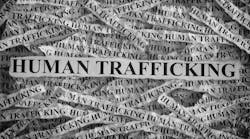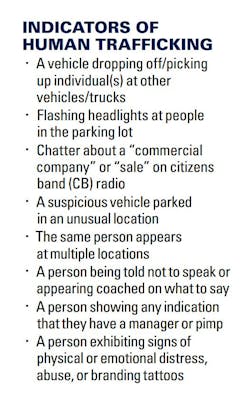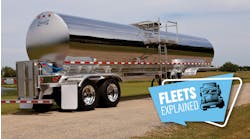A new campaign launched by the Federal Motor Carrier Safety Administration joins others like it in again enlisting trucking stakeholders—particularly drivers—in what has become a yearslong mission: Alerting authorities to the scourge of human trafficking, particularly along highways at travel stops and rest areas, where young people, sometimes underage girls, are exploited by handlers for money, often in prostitution or theft schemes.
The FMCSA campaign, “Your Roads, Their Freedom,” launched in late May, joins the ongoing effort by Truckers Against Trafficking (TAT) and another five-day event earlier this year in January by the Commercial Vehicle Safety Alliance, which also runs the annual International Roadcheck three-day blitz of truck inspections and boasts a vast network of truckers and law enforcement who can be on the lookout for criminal activity involving human trafficking.
“CVSA’s law enforcement and motor carrier communities are committed to bringing attention to human trafficking,” CVSA President Maj. Chris Nordloh with the Texas Department of Public Safety said before the kickoff of the January event. “Working together, we will put an end to this crime.”
See also: How vigilant truckers can disrupt 'modern-day slavery'
The latest FMCSA push is part of the U.S. Department of Transportation’s Leaders Against Human Trafficking (TLAHT) awareness effort to educate the freight-hauling industry on recognizing and reporting suspected instances of human trafficking. Campaign resources and content are available for download and visitors to the campaign website can sign up to become a signatory on the TLAHT pledge to help thwart human trafficking.
“Human trafficking is a crime that poses a threat to transportation safety in every state across the U.S.,” campaign officials with Your Roads, Their Freedom said in a May 31 email announcing the FMCSA effort. “As the eyes and ears of the nation’s roadways, America’s 8.7 million-strong [commercial motor vehicle] workforce is in a unique position to make a difference.”
Human trafficking awareness campaigns proliferate
Perhaps one of the more poignant first-person stories of women caught in the human trafficking crisis shared by TAT was that of Liz Williamson, who, when she was 6 years old, was sold by her mother into the sex industry and endured constant abuse for the rest of her childhood until she was able to escape 12 years ago. Williamson was enlisted to share her story as a field trainer for Truckers Against Trafficking.
TAT warns that trafficking not only includes victims—who are sometimes referred to as “lot lizards”—forced to engage in sex acts for money but also using them for forced labor through fraud or coercion. Domestic servitude can involve working and living in the home of the perpetrator, who confiscates documentation to prevent the individual from leaving.
TAT certifies truck drivers who become knowledgeable in recognizing signs of human trafficking and where to report it. Carriers can also create TAT-guided programs to educate their entire organization on ways to counter the problem. Additionally, TAT has programs for law enforcement and has formed a coalition of convenience stores so they can play a role in recognizing this crime.
A few years ago, Women In Trucking Association partnered with TAT through the “lip balm” project, which trained female truck drivers to spot potential victims in truck stop restrooms and hand them a lip balm with information on finding a way out of the situation. Human trafficking has been reported in all 50 states, and the number of victims nationwide is estimated in the hundreds of thousands, TAT said.
See also: How trucking can combat human trafficking
“Unfortunately, it's a sad reality,” Antoine Sadler, a professional driver for Walmart Transportation, board member of TAT, and a longtime supporter of TAT’s mission, told FleetOwner last year. “From a driver's perspective back when I first joined TAT in 2016, I felt this was just a choice that a lot of people were making. Once you get the understanding, you get the training, you understand that these people are forced into this way of life due to whatever circumstances that it comes from.”
"Sex trafficking victims are often coerced by their trafficker to solicit customers by means of advertising over CB radio, knocking on truck cab doors, walking up and down the tarmac, or directly approaching and offering services to men," the Polaris Project findings continue. "In addition to engaging in commercial sex, sex trafficking victims may be required by their traffickers to engage or facilitate other crimes such as cargo theft, petty theft (e.g., wallets or personal items), identity theft, or selling and/or transporting illegal narcotics or other contraband."
Readers can find printable Truckers Against Trafficking materials on its website and can report suspected human trafficking incidents by calling the National Human Trafficking 24/7 confidential hotline at (888) 373-7888 or by texting 233733 or BEFREE.





